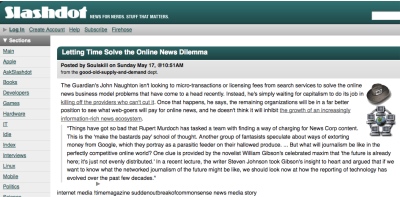I must be getting old: I find myself agreeing with Steve Ballmer. There’s a terrific interview with him in today’s NYT. I particularly like this bit:
Q. What’s it like to be in a meeting run by Steve Ballmer?
A. I’ve changed that, really in the last couple years. The mode of Microsoft meetings used to be: You come with something we haven’t seen in a slide deck or presentation. You deliver the presentation. You probably take what I will call “the long and winding road.” You take the listener through your path of discovery and exploration, and you arrive at a conclusion.
That’s kind of the way I used to like to do it, and the way Bill [Gates] used to kind of like to do it. And it seemed like the best way to do it, because if you went to the conclusion first, you’d get: “What about this? Have you thought about this?” So people naturally tried to tell you all the things that supported the decision, and then tell you the decision.
I decided that’s not what I want to do anymore. I don’t think it’s productive. I don’t think it’s efficient. I get impatient. So most meetings nowadays, you send me the materials and I read them in advance. And I can come in and say: “I’ve got the following four questions. Please don’t present the deck.” That lets us go, whether they’ve organized it that way or not, to the recommendation. And if I have questions about the long and winding road and the data and the supporting evidence, I can ask them. But it gives us greater focus.
I’d go further. When I’m Supreme Leader all the chairs will be removed from committee meeting rooms.
The serious point behind Ballmer’s Meetings 2.0 is not so much that it’s efficient (which it is) but that it means that each meeting adds value or moves things on. And, in a way, that’s the whole point of our networked information ecosystem. One can often assume nowadays that anyone who’s prepared to put in a little effort can be as well informed as you are. So the question then becomes: how can s/he or we add value and move us on?
I tried to make this point in my seminar last week at the Reuters Institute in Oxford. I said I was sick and tired of seeing an expensive TV journalist being filmed outside the door of 10 Downing Street telling me stuff that I already know. I want him or her to move the story on, not waste airtime and bandwidth in useless summary or colourful waffle.
The other really interesting point to emerge from the Ballmer interview is that his favourite ‘management’ book is Bill Collins ‘Built to Last’ .
.

